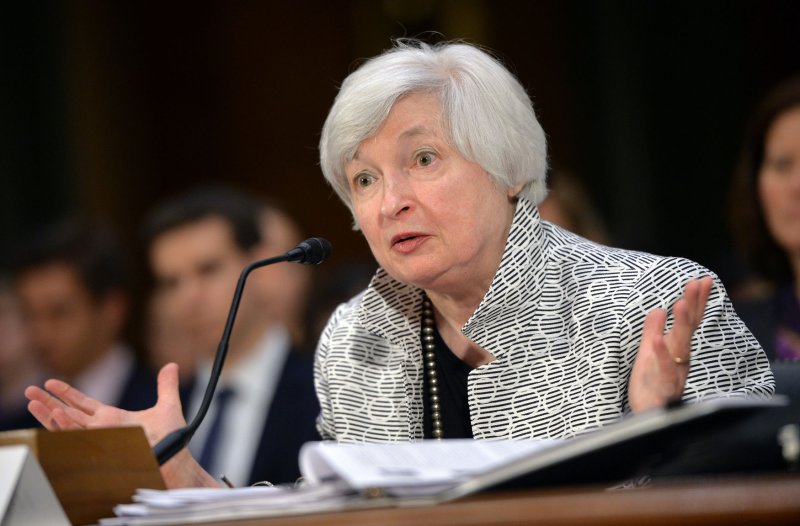1 of 15 | Federal Reserve Board Chairwoman Janet Yellen testifies on the Federal Reserve's Semiannual Monetary Policy Report to the Congress, during a Senate Banking, Housing and Urban Affairs Committee hearing in Washington, D.C. on July 15, 2014. UPI/Kevin Dietsch |
License Photo
WASHINGTON, July 16 (UPI) -- Federal Reserve Chairwoman Janet Yellen said Tuesday that the Fed will stay the course with its low interest rate to support the economy because significant slack still persists in the labor market. She also signaled the Fed's asset purchase plan may end in October.
"Although the economy continues to improve, the recovery is not yet complete," Yellen told the Senate Committee on Banking, Housing and Urban Affairs. "Even with the recent declines, the unemployment rate remains above Federal Open Market Committee participants' estimates of its longer-run normal level."
"A portion of the decline in labor force participation we've seen is a kind of hidden slack of unemployment," Yellen said at the hearing.
She also said the Fed should continue its "accommodative" monetary policy in the face of weaker labor force participation and an elevated long-term unemployment rate.
Yellen's testimony came after a rosy job report showed a stronger labor market in June. The unemployment rate dropped to 6.1percent in June, the lowest since 2009. About 288,000 new jobs were added, well above the market's anticipation.
The rebound of the labor market has fueled debate on whether it's time to hike the Fed interest rate. A low interest rate has provided incentives to push investors to chase after high yields and thus shored up the stock market. Wall Street viewed raising the interest rate as a potential headwind for the capital market. But some people worried the Fed's policy to maintain low rate may create asset bubbles.
"While prices of real estate, equities and corporate bonds have risen appreciably and valuation metrics have increased, they remain generally in line with historical norms," Yellen said.
Yellen reiterated the current short-term interest rate will remain unchanged.
"The current target range for the federal funds rate likely will be appropriate for a considerable period after the asset purchase program ends, especially if projected inflation continues to run below the committee's 2 percent longer-run goal...," Yellen said.
At a June meeting of the Federal Open Market Committee, the majority of participants believed it would be appropriate to wait at least until 2015 before starting to increase the federal funds rate.
During Tuesday's the hearing, Sen. Charles Schumer, D-N.Y., urged Yellen to be cautious when making decisions to accelerate the elimination of the asset purchase plan and raising the interest rate.
"To me, the greatest problem this country still faces is lack of good-paying jobs, decline of middle-class incomes," Schumer said. "That's with us very, very strongly."
After the financial meltdown in 2008, the Fed lowered the interest rate to near zero to stimulate the economy. Since then, the Fed has relied on asset purchase and forward guidance to fight unemployment and maintain stable prices.
In June, the Fed signaled that it may cease to buy long-term securities in October.
"If incoming data continue to support our expectation of ongoing improvement in labor market conditions and inflation moving back toward 2 percent, the committee likely will make further measured reductions in the pace of asset purchases at upcoming meetings, with purchases concluding after the October meeting," Yellen said.










